The year 2014 was a pretty awesome one for the beautiful game – brilliant all round action in the top South American and European leagues sandwiching arguably the most entertaining world cup for quite a long while. Brazil delivered – well, not A Selecao, but you know what I am getting at.Amidst all the joy though, there is a tinge of sadness. Because the year also saw the retirement of some of the greatest and most iconic footballers the modern game has seen. Here we pay tribute to the playing careers of ten of the greatest
#1 Ryan Giggs
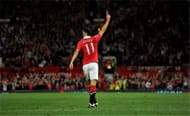
The sight of him in full flight was a joy to behold. Wavy hair streaming behind him as he swerved hither and thither at top speed, the baggy red jersey billowing around him like the topsail of the Cutty Sark, Ryan Joseph Giggs, in the inimitable words of his manager, Sir Alex Ferguson “floated over the ground like a cocker spaniel chasing a piece of silver paper in the wind”
He left defenders with knotted veins and twisted limbs with that special blend of pace, body balance and bold directness; the kind of heady mixture that brought back memories of arguably the greatest dribbler to grace stadiums in the British Isles, another man who wore the no.11 (whenever he started on the left) of Manchester United with great distinction – Georgie Best.
Arguably one of Sir Alex’s great deals – when he convinced the then 14 year old Welsh wunderkid to sign for the Red half of Manchester instead of their azure neighbours – Giggs soon back the symbol of all that was great about Fergie’s reign at Old Trafford.
Playing alongside the brilliant (yet painfully maverick) Lee Sharpe and Andrei Kanchelskis, Giggs provided the ideal foil to the genius of Eric Cantona and made United the most feared offensive force in the land. He later did the same with Roy Keane, David Beckham and Paul Scholes and even later with Wayne Rooney and Cristiano Ronaldo.
Twenty two years after he had first burnt grass with his pace and skill, he had transformed himself to become the wise old master that provided knowledgeable advice, laser-guided passes and the occasional critical goal when called upon. Giggs’ greatness had been sealed by the incredible display of adaptability and footballing intelligence that he put on in the latter stages of his career.
Yoga, bloody-minded dedication and an undying love for the game saw Giggs become the most capped player in the long history of the Manchester United Football Club as well as the most decorated British footballer ever.
He’s still there at Old Trafford, just that these days he can be found sitting beside the gaffer, learning the tools of the new trade he seems set on bending to his iron will.
#2 Clarence Seedorf
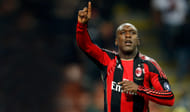
When the coach of Real Madrid, Fabio Capello, walked in to give the ‘hairdryer’ treatment to his team after a particularly, he saw his midfield dynamo, the newly signed Clarence Seedorf, already dishing out tactical advice to his teammates. Furious, the great Italian threw his coat at the Dutchman saying “If you know so much, why don’t you become (the) coach!”.
Seedorf was just 20 at the time.
That was the kind of guy Clarence Seedorf was -the epitome of the stereotypical Dutch footballer – technically talented, tactically astute and stubbornly (and often, loudly) opinionated. Although his relationship with Capello was pretty warm, his outspoken-ness often got him into hot water with a lot of powerful people over the course of his long career –a prime example of this, his ego feud with Marco Van Basten that famously limited his career with the national team (if you can call 87 appearances limited).
On the field though, he was the kind of player most managers would kill to have on their side – built like a pit bull, he was as ferociously intense as those magnificent animals; his exemplary vision, passing range and long-range shooting combining with a seemingly boundless reservoir of energy to make him the heart of any midfield he played in.
You don’t become the first person to win the notoriously hard to win Champions League with three different clubs without being rather good at the game of football.
In typical Seedorf fashion, just two days after the announcement of his retirement, he told the world that he was going to take over managerial duties at Milan. He wasn’t very successful in his time with his beloved Rossoneri (admittedly with the most mediocre squad in Milan’s modern history at his disposal), but for those who have followed the career of this intelligent, articulate Dutchman, there is very little doubt he will find success wherever he ends up – sooner rather than later.
#3 Rivaldo
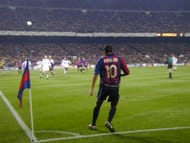
An ugly scowl seemingly etched permanently into his sullen, sunken face (the aftermath of a malnourished childhood), Rivaldo was never one of the most likeable of footballing icons. This, despite being one of the greatest players of his generation.
With an air about him that could have put the Grinch to shame, the gangly, bandy-legged magician always looked like he was channeling an inner rage that consumed him whenever he set foot on a football pitch to become the creative (and goal-scoring) hub of any team he played for –whether it be in Brazil, Spain, Greece, Uzbekistan (!) or Angola (!!!)
In his prime, the cantankerous Brazilian was as close to unstoppable as a footballer has gotten since the days of Diego Maradona. Blessed with deceptive pace, a left foot that was in equal parts Thor’s Hammer and Rembrandt’s paintbrush and a magical ability to make the ball do just what he wanted, Rivaldo was a finely honed attacking weapon who had it in him to win matches all by his lonesome.
Which is why it is such a pity that the overpowering memories of him these days are either those of him playing in the Greek league (all due respect to AEK and Olympiakos) or even worse – the ugly incident in the semifinals of the 2002 World Cup where his ludicrous playacting got Hakan Unsal sent off.
For, Rivaldo deserves to be remembered for the great feats he did on the football field – whether it be the goals (and the mother of all dummies) that won Brazil their fifth World Cup, or the numerous times he had defenders in La Liga tied in knots with his mazy and wirily strong dribbling.
Most of all though, he must be lauded quite simply for managing to find the most attractive ways to score the most decisive goals – not least of all when he scored arguably the greatest hat-trick of the modern age to seal Barcelona’s European spot in 2001-02 in that epic 3-2 victory over fellow contenders Valencia, his third coming via a jaw-dropping, mind-bending bicycle kick hit from outside the box in the 90th minute!
Post retirement he now spends his time trying to run one of his earliest clubs, Morgi Mirim, a Sao Paulo club, where he is now President. (He did play one game for them earlier this year - alongside his rather unimaginatively named son, Rivaldinho.)
#4 Javier Zanetti
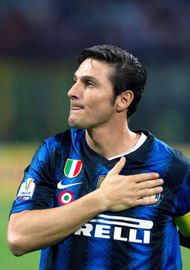
“If I got angry every time Javier went training, then I would have had a sour face on every day since I was 14 years old"
So said Paula Zanetti when recalling that just an hour before their wedding her husband had gone on his daily morning run. She also recalls the day when they arrived at a hotel on a hard-earned vacation only to find out there was no gym in the place. Undetered, her husband used her as a barbell to do his customary squats.
You see, there is dedication and there is bloody-minded dedication. And then there is Javier Adelmar Zanetti-level dedication. Argentines don’t get nicknamed ‘il Capitano’ by fanatic Milanese without being that extra-bit special.
With nary a strand out of place in that impeccable old school styled hair (a style that hasn’t changed ever since the days his mother would ‘gel’ it down with a dash of plain water when he was a teenager) he has been the charismatic driving force of the Argentine and Internazionale teams for what seems like forever now. Legs that never seemed to stop pumping and feet that were adept at controlling the ball, and an innate ability to read the flow of the game(both offensively and defensively) saw him play all over the park - even though it was at right back that he was truly the best in the world.
He has played more games than anyone in the history of both those grand old teams – 145 for La Albiceleste and a jaw-dropping 838 times for the Nerazzurri. (He’s also second in the list of most appearances in Serie A -behind only another timeless legend in Paolo Maldini) It wasn’t just longevity for the sake of it - his influence on the pitch was such that even in his late thirties he played for well over thirty games a season - the man just played day in and day out. These days, he gives back to the club that made him what he is, as Sporting Director.
What Roberto Mancini wouldn’t give today to get the man they affectionately call ‘Pupi’ out from behind that desk and onto the green grass he loves so much.
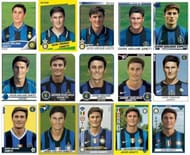
#5 Park Ji Sung
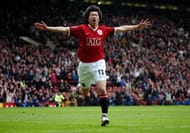
"Even [Sir Alex] Ferguson, the purple-nosed manager who turned Manchester United into a fearsome battleship, couldn’t resist the temptation… On one of the many occasions when our paths crossed during my time at Milan, he unleashed Park Ji-sung to shadow me. The midfielder must have been the first nuclear-powered South Korean in history, in the sense that he rushed about the pitch at the speed of an electron." So said the great Andrea Pirlo, in his wonderful autobiography, while recounting tales about the men that bothered him most on the football field.
High praise coming from the most unhurried footballer in the modern game!
Entirely unglamorous (NOT in his native Korea – but for most European audiences), Park is the most successful Asian football player in history – having won unprecedented success in the Dutch and English domestic football competitions along with European glory.
Hidden sometimes by the sheer number of kilometers he covered on the football pitch was an intelligent footballing mind and a wonderful ball playing footballer with exceptional technical skill. The Korean superstar’s off-the-ball movement and uncanny ability to come up with the right pass at the right time made him as much of a nightmare to opposing defenders as his tireless harrying and clean tackling made conditions akin to living hell for opposing forwards.
Capable of playing anywhere in midfield – and more than willing to do so – Park was a big-game player. So much so that it was rare to see United line-up without him for any of their biggest matches during his playing days – even if it came at the expense of a more expensive, more ‘glamorous’ superstars.
If ever a big game cam a-calling, Three Lungs Park was bound to be in the thick of it all – tenacious, selfless and supremely effective.
In his the old idiom of cometh the hour, cometh the man held more truth than with most - whether it be while scoring the winning goal on one of those famous European nights at Old Trafford against the likes of Chelsea or while smashing in the goal that would knock Portugal out of the World Cup in front of sixty thousand fanatic, screaming, joyous countrymen.
#6 Eric Abidal
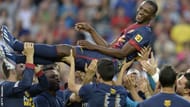
There are some things that go beyond even the most intense rivalries on a football pitch. A footballer’s life hanging in the balance quite comfortably counts as one of them. Which was why it was heartening to see the message on the specially made t-shirts worn pre-kick off during a Champions League tie by Real Madrid and on the scoreboards at the legendary Santiago Bernabeu stadium. The message read simply “Ánimo Abidal” – “Get Well Soon Abidal”
Just a week previously, Madrid’s hated rivals, Barcelona, had announced that Eric Sylvain Abidal – the left back who was so good that the Madridistas were probably sick at the sight of his Blaugrana jersey and the no.22 on it - had been diagnosed with a tumour in his liver.
Two months later he would have played the full 90 minutes and lifted the Champions League trophy after aiding in the evisceration of Manchester United at Wembley stadium.
At times forgotten these days - admist the fairytale story of his success against the deadly disease that afflicted him - is the fact that, at a point in time during the heydey of Pep Guardiola’s all-conquering Barcelona, the Frenchman was quite simply the best left back in the world.
His positional discipline and remarkable defensive abilities were crucial in letting Dani Alves, the rampaging Brazilian, create so much havoc on the opposing flank -whenever Alves would go on one of his marauding runs, Abidal would tuck in to alongside Puyol and Gerard Pique to guard against any team that looked to break quickly. His pace, strength and technical skill made him the established left back at the all-conquering clubs sides he played for – Lyon and Barca – and also saw him win 67 caps for his nation (his limited success with Les Bleus mostly due to the fact they were going through one of the worst periods in their history when he was in his prime)
A year after the Champions League final, his liver would create trouble again, but it is a measure of the man that he came back again. And succeed. The ever reliable Frenchman helping his ‘new’ club Monaco (the club where he started his storied career) to a second place finish in Ligue 1 in his last full season playing the game that meant everything to him.
#7 Carles Puyol

Ah! Barcelona! Purist heaven, land of tiki-taka and soft-shoed little playmakers who make your heads go dizzy as they go about their business creating pretty triangles all over the pitch. If football were music, then the Catalan giants would be the custodians of all things classical – soothing, tender and romantic to the core.
And then up steps their of a decade, Carles Puyol. Looking (and playing) like he just stepped out a Norse Death Metal album - with that trademark long, shaggy hair streaming behind him and look of maniacal zeal plastered on his face - Puyol has been the rock on which two of the greatest footballing sides in history (Barca and Spain) have built their dominance.
It’s easy to mistake the natural tendency of his to throw himself at every shot, put himself in harm’s way to prevent a goal and generally do brave (yet, seemingly stupid) things – as the signs of a caveman, an unsophisticated bugger who was essentially a throwback to the good (by good I mean scary as hell) ol’ days when defenders often used to be just plain thugs disguised as footballers.
He was in some ways – strong in the air and uncompromising in the tackle – but to limit him to those stereotypical boundaries would do no justice to his qualities on the pitch. Puyol’s seemingly chaotic approach to the game (a last ditch, fight-to-put-out-fires-as-they-spring-up-all-over-the-place-approach) had a sound method hidden in the madness.
You can’t put in a last ditch tackle unless you can read the game and anticipate where you are needed to be to. This Puyol did better than most defenders have done in the modern era. His bravery – the one thing every football fan associates with the Catalan – also serves to hide his great skill with the ball at his feet. An accomplished dribbler (who was exceptional at right back in his earlier days), he was
It is a mark of the great man that in his absence, Barcelona and indeed Spain appear so much less imposing as a team. Tarzan will take some replacing.
#8 Juan Sebastian Veron
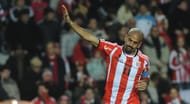
“He's a f**ing great player. Yous are f***ing idiots” said a blindly furious Alex Ferguson to the assembled British press who had been busing lambasting a very poor early season showing by one of Fergie’s most expensive signings – Juan Sebastian Veron. Yes, he was a pretty bad failure at Manchester United (and even more so at Chelsea later on) but there is no doubting the truth in the fiery Scotsman’s words – La Brujita (The Little Witch) was a f***ing great player. He didn’t succeed in Britain but whether for his hometown club, the great Estudiantes or the Italian clubs he played at– Sampdoria, Parma and especially Lazio – he was a true magician.
A mastermind who saw the football field like a grandmaster sees a chessboard, there was little Veron couldn’t do on the football field – his vision and passing range was un=paralled, but what set him apart from the rest was his physicality – big and strong the stormy Argentinian could give as good as he took.
He also had on him a shot that could send shivers down the spine of many a goalkeeper – as much for its accuracy as its ferocity. In the English media his reputation has still not fully recovered, the effects of that sad spell in the Old Blighty. To put the record straight, it was just that his style of playing wasn’t suited to the all-action, furiously fast pace of the English game which left no place for the creative playmaker to do his thing.
His time in Rome was arguably the best in his career – he was the chief conductor of the orchestra that was Lazio in the late 90’s his skill and will driving the Romans to unprecedent glory domestically and in European competition.
#9 Juninho Pernambucano
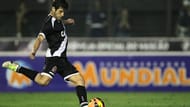
There was a time in Ligue 1 history when Olympique Lyonnais looked they had the run of the pitch whenever they had the ball. Defenders often let the attackers of Lyon have unprecedented freedom in the last third of the pitch – seemingly afraid of closing in too much and conceding a freekick anywhere near their penalty box.
All that extra care was due to one man, an unassuming Brazilian wearing no. 10 who went by the name of Juninho Pernambucano. For no one in the history of the game has taken freekicks quite like the Brazilian genius. The sight of him stepping up to a dead-ball could put the fear of God in any goalkeeper.
Whether curling it from twenty five yards or, smashing It in from forty, Juninho could do them all. As if a full repertoire of your standard-issue curlers and howitzers weren’t enough the man could do things never before seen – with the patented knuckleball, a shot where the ball would go over the wall and then dip viciously, the pick of the lot.
“He’s the best in history – by miles,” Thierry Henry once declared, adding: “I’ve never even tried to do what Juni does because I wouldn’t be able to figure it out.” Messrs. Pirlo, Ronaldo and Bale have emulated with varying degrees of success over the years with the great Italian probably coming closest in pure technique. It didn’t come easy, in his own words – “During his time at Lyon, that man made the ball do some quite extraordinary things. He’d lay it on the ground, twist his body into a few strange shapes, take his run-up and score. He never got it wrong. Never. I checked out his stats and realised it couldn’t just be chance. He was like an orchestra conductor who’d been assembled upside down, with the baton held by his feet instead of his hands … I studied him intently, collecting DVDs, even old photographs of games he’d played”
It wasn’t just freekicks, Juninho was a class act in open play as well – with the quintessential Brazilian mix of vision, flair and killer instinct. He was instrumental in the successes of the clubs he spent most of his career playing at – Lyon and his beloved Vasco de Gama.
Before he got to Lyon in 2001, the French club hadn’t won a single Ligue 1 title. By the time he left French shores in 2009, they had won seven. They haven’t won any since.
Coincidence? I think not.
#10 Thierry Henry
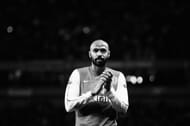
There was a time in the early 2000s when a Frenchman ruled as King of North-London. He no longer plays there – but as that statue outside the stadium of Arsenal Football Club shows, his legacy will last for a long time on that land.
For the club and its many fans, Thierry Daniel Henry will always be King Henry.
Brought to Arsenal by his first coach, Arsene Wenger, the Frenchman took to the English game like a fish to water. A great white shark of a fish. It didn’t make much sense at the time though, as Henry, after his move to Juventus, had been struggling for form – looking stranded on the left wing for the Old Lady of Turin.
The enigmatic Wenger knew what he was doing though. Asking Henry to shift to the middle and spearhead the Arsenal attack was arguably the single most defining moment of Arsenal’s long and storied history. It was there, where he formed a killer partnership with the great Dutch master, Denis Bergkamp, and later graduated to leading the line virtually on his time.
In his prime, a time that lasted quite a while, Henry was the scariest footballer playing the game in the world. Tall and strong, he was strong in the air – but it was with the ball at his feet that the man for Essonne really came into his own. Frighteningly quick (on many an occasion, assistant referees across Britain would call him offside when he wasn’t – it really didn’t appear possible that someone could be that quick)
He terrorized defences with a degree of ball control at high pace that bordered on the obscene, and goalkeepers with his immaculately precise shooting. And unlike many great goalscorers, he wasn’t a penalty box predator – frequently drifting toward the left wing and creating goalscoring opportunities aplenty. He was, in short, the perfect striker for an Arsene Wenger team.
His time at Barca, was trophy laden, yet relatively staid – the overpowering genius of Lionel Messi and tiki-taka moving him to the shadows. He ended his career playing with the New York Red Bulls – his kickass beard and imperially aloof coolness making him look like he had just gone back to his old high school and was doing ridiculously awesome things simply to show off in front of the kids.
